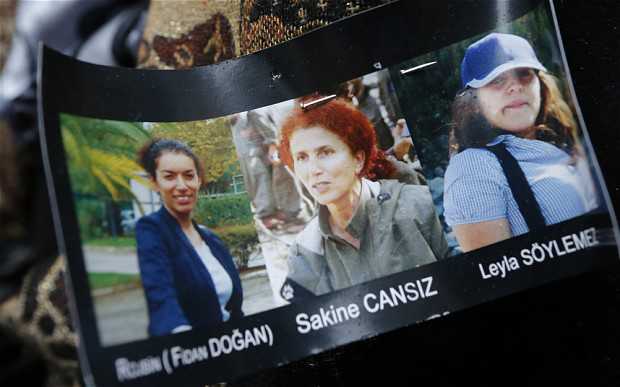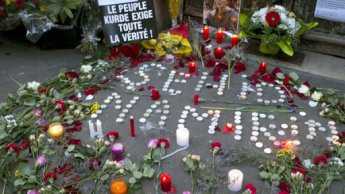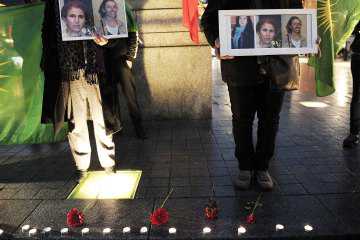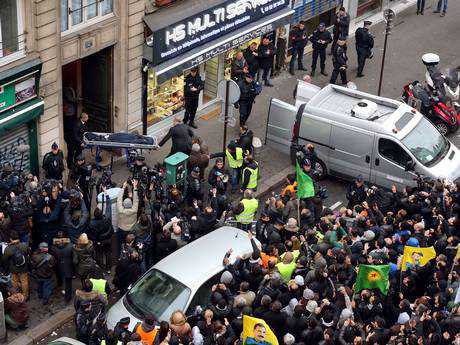Turkey has condemned the killing of three Kurdish women activists in Paris, calling the murders a “summary execution.”

Portraits of presumed victims are seen pinned on a member of the Kurdish community’s coat at they gather next to the entrance of the Information Centre of Kurdistan in Paris.
Portraits of presumed victims are seen pinned on a member of the Kurdish community’s coat at they gather next to the entrance of the Information Centre of Kurdistan in Paris. Photo: REUTERS
3:21PM GMT 10 Jan 2013
Bulent Arinc, a government spokesman, said the deaths were “carried out in the manner of a summary execution”.
“This is utterly wrong. I express my condolences,” he said.
His remarks came just hours after three Kurdish women, a co-founder of the outlawed Kurdistan Workers’ Party (PKK) and two other activists, were found shot dead in Paris early on Thursday, in what French authorities labelled an “assassination.”
Speaking from Senegal, Turkish Prime Minister Recep Tayyip Erdogan said it was “too soon to comment” but the incident could be a “provocation” coming at a time when peace talks between the state and the PKK’s jailed leader Abdullah Ocalan were under way.
The slayings came as Turkey was holding peace talks with the group to try to persuade it to disarm. A Turkish lawmaker claimed the women were slain in a dispute between PKK factions, while some Kurdish protesters and a Kurdish lawmaker in Turkey claimed the Turkish government was involved.
Turkey’s Anadolu news agency identified one of the victims as Sakine Cansiz, a founding member of the PKK.
The conflict between the PKK and Turkish troops has claimed tens of thousands of lives since 1984, when the rebels – who are seeking self-rule for Kurds in southeast Turkey – took up arms.
Manuel Valls, the French interior minister, who visited the pro-Kurdish centre in Paris where the bodies were found, said the deaths were “without doubt an execution.” He called it a “totally intolerable act.”
RTL radio reported that all three women were shot in the head, but French police would not immediately confirm the report.
Emotions mounted as hundreds of Kurds filled the street in Paris outside the Kurdistan Information Center. Police erected barricades to try to contain the crowd. Some people waved Kurdish flags while others chanted angrily against the Turkish government.
An online site for Kurdish youth called on all Kurds and “friends of Kurds to come to Paris.” The site, jeunessekurde.fr, showed three photos of the slain women. It identified the other two as Fidan Dogan, who reportedly was chief of the information centre, and Leyla Soylemez.
Kurds make up more than 20 per cent of Turkey’s 75 million people.
The three women were alone at the centre on Wednesday and were unreachable by telephone, said Leon Edart, an official of the Federation of Kurdish Associations of France.
In Turkey, Selahattin Demirtas, the leader of a Kurdish political party in Turkey’s parliament, called on the French government to shed light on the killings “without delay” and in a way that “leaves no room” for doubt.
“We want it to be known that that these assassinations which were carried in the busiest area of Paris cannot be covered up,” Demirtas said.
Huseyin Celik, the deputy chairman of Turkey’s ruling party, said the attack appeared to be the result of “an internal feud” within the PKK, but did not provide any evidence to back his statement.
Celik also suggested the slayings were an attempt to derail the peace talks.
The PKK does have a history of internal executions. While many Kurdish activists and militants were victims of extra-judicial killings blamed on Turkish government forces in the 1990s, it’s not known whether they also targeted any exiled Kurds in Europe.
In the streets of Paris, the protesters blamed Turkey.
“Where are French? Where is that solidarity? I think that the state of Turkey did this,” said one man in the Paris crowd, identifying himself only as Ali.
Turkey frequently accuses, France, Germany and the Netherlands – home to large numbers of Kurds from Turkey – of supporting the PKK, failing to extradite wanted militants and of not backing Turkey’s “fight against terrorism.”
Turkish officials say the PKK raises funds through extortion or other criminal activities in European countries that have a large number of Kurdish immigrants.
France has a large Kurdish community concentrated in the Paris region and French police have occasionally arrested Kurds suspected of illegally financing the PKK.
via Turkey condemns killing of Kurdish activists – Telegraph.





